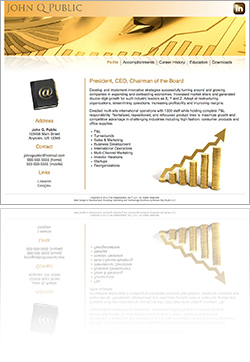 Even the most accomplished executives need help branding and packaging themselves for today’s competitive market. Besides a well-written, attention grabbing resume that tells your stories and highlights your skills and achievements, you also need an online presence in the form of a web portfolio. Why a web portfolio?
Even the most accomplished executives need help branding and packaging themselves for today’s competitive market. Besides a well-written, attention grabbing resume that tells your stories and highlights your skills and achievements, you also need an online presence in the form of a web portfolio. Why a web portfolio?
Logistics. A web portfolio designed with HTML5 enables hiring managers and executives to see your background even when they’re on the go. By including the URL to your web portfolio in your signature line or sending a link via email, the recipient can open an impressive display about you on any tablet, iphone, android or mobile device anywhere they have Internet access. You can also include the link on your LinkedIn profile.
Beyond the resume. A web portfolio allows you to go beyond the resume, enabling you to add sections on successful projects, accolades, articles, patents or any other achievements that will sell you and your brand to the decision maker.
Tech savvy and very “today”. Web portfolios aren’t just for creative types, techies and recent graduates. They show you’ve not only embraced our Internet age, you’ve mastered it. This can be very important for more experienced and shall we say mature executives.
Marketing magic. An expertly written, attractive web portfolio turns you into a cutting-edge candidate who truly stands out. Having a sophisticated, polished web presence gives you a leg up on the competition. You can get that leg up at The Imagemakers, Ink!™ LLC with one of our exceptional web portfolios.
A well-written resume and well-designed web portfolio is the one-two punch you need to knock-out the competition and should be a part of every executive and professional career campaign.
~Linda


